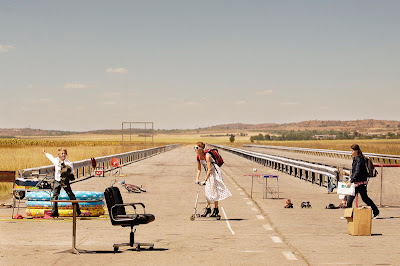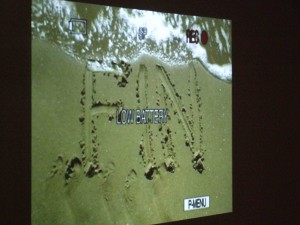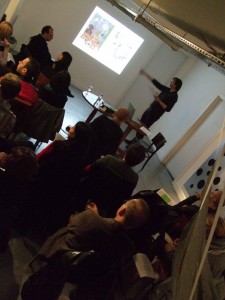News
Friday 5 February 2010
Room 2.05c, 4-12 Little Titchfield Street, University of Westminster, London W1W 7UW
Cost: £20/£10 concs.
Download a booking form here
10:00 Introduction
10:15-12:30 Session 1: Cartographies of Power
Iain Chambers, University of Naples, Italy
Joachin Barriendos, Curator, Santa Monica Art Centre, Barcelona, and Professor Anna Maria Guasch, University of Barcelona, Spain
Dr Almira Ousmanova, European Humanities University, Belarus/Lithuania
12:30-1:30 Lunch
1:30-3:45: Session 2: Education, Education, Education
Professor Adrian Rifkin, Goldsmiths, University of London, England
Lorraine Audric and Professor Andre Gunthert, Laboratoire d’histoire visuelle contemporaine, L’Ecole des Hautes Etudes en Sciences Sociales
Dr Nina Lager Vestberg, Norwegian, University of Science and Technology Trondheim, Norway
3:45-4:15 Break
4:15-6:30: Session 3: Projects
Dr Oyvind Vagnes, University of Bergen, Norway
Kresimir Purgar, Center for Visual Studies Zagreb, Croatia
Professor Oliver Grau, Danube University, Krems, Austria

Friday 5 February 2010
Room 2.05c, 4-12 Little Titchfield Street, University of Westminster, London W1W 7UW
Cost: £20/£10 concs.
Download a booking form here
10:00 Introduction
10:15-12:30 Session 1: Cartographies of Power
Iain Chambers, University of Naples, Italy
Joachin Barriendos, Curator, Santa Monica Art Centre, Barcelona, and Professor Anna Maria Guasch, University of Barcelona, Spain
Dr Almira Ousmanova, European Humanities University, Belarus/Lithuania
12:30-1:30 Lunch
1:30-3:45: Session 2: Education, Education, Education
Dr Joanne Morra, Central Saint Martins, University of the Arts London, England
Lorraine Audric and Professor Andre Gunthert, Laboratoire d’histoire visuelle contemporaine, L’Ecole des Hautes Etudes en Sciences Sociales
Dr Nina Lager Vestberg, Norwegian, University of Science and Technology Trondheim, Norway
3:45-4:15 Break
4:15-6:30: Session 3: Projects
Dr Oyvind Vagnes, University of Bergen, Norway
Kresimir Purgar, Center for Visual Studies Zagreb, Croatia
Professor Oliver Grau, Danube University, Krems, Austria
The Future Papers, Part Three: Stephen Melville
Tagged as art, science fiction, The Future

The third and final part in a short selection of transcriptions of talks from the recent series on ‘The Future’ at the David Roberts Art Foundation. Here’s Stephen Melville’s paper, which constituted a fitting finale to the series. Is the future now?
4. The Future is Now, Now is the Future
Stephen Melville
The two earlier discussions in this series that I was able to attend both seemed to turn quite strongly on a contrast between modern and postmodern representations of the future, more or less as they appear to line up with the contrast between so-called Golden Age and New Wave science fiction. It’s been hard for me, at least, not to hear bits of Beckett stammering in the background, so I was happy to hear Krapp’s Last Tape surface briefly on Saturday. The overall contrast seemed, roughly, one between a future fully distinct from the present and underwritten by a certain faith in science, and a future underwritten by technology and threatened with imminent collapse into the present (or, as one speaker put it, having the shape of an endless intensification of the present) – thus tending also toward a contrast between the utopian and the simulacral, as well as between progress and repetition, and – at least I’ve tried to suggest this – between a certain assumption of shared human being or community and a skepticism about other minds registered, among other places, in a shift in the understanding of the material basis or medium specificity of film from a photographic practice to a form of animation. This last maybe permits an expansion of the postmodern/New Wave text to take account of our apparent current interest in various forms of the undead, and most notably the emergence of the postmodern speed zombie. Neither of these representations seems satisfactory: the Golden Age is, as it were, too much future and in that sense doomed to fail, while the New Wave seems finally not a future at all. Both politics and religion have remained for the most part discreetly in the background, especially religion – which is odd to the extent that one of our continuing interests in the future is, I think, broadly redemptive (certainly notions of apocalypse and the post-apocalyptic, of things more or less shaped like the end of history or the end of the world have put in appearances). It’s perhaps worth opening the contrast a little further off its native ground by taking note of the evident difference between a modern stock market in which one invests for a future that must be awaited, and a postmodern stock market in which futures themselves become a primary commodity and one dreams – sometimes of course in real money – of a present profit made by strip-mining the contingency of the future. Our moment seems to be one that wants to read the phrase ‘the future is now’ – a phrase that I think goes back to the 1950s as a way of naming the new marvels of the present – as ‘now is the future,’ thus as a promise of no more marvels.
Continue reading The Future Papers, Part Three: Stephen Melville

The second part in a short selection of transcriptions of talks from the recent series on ‘The Future’ at the David Roberts Art Foundation. Here’s Garin Dowd’s paper from the final night, seamlessly drifiting from Beckett to Ballard, Deleuze to Daney.
3. ‘Replay: conducts of time x 4 (interstitial pedagogies)’
Garin Dowd
I borrow the idea of conducts of time from Eric Alliez. Conducts would refer to behaviours – and suggest an ethology – but also to channels. Conducts of time are also ‘gaits’ of time, postures of time in movement; equally they might inhere in the pas au-delà, the step which is also a pas – a not, in Jacques Derrida’s formulation (via Blanchot). Conducts of time may give rise to systole or diastole, to condensations and saturations, as in running on the spot, and to disseminations. It may produce reifications and consolidations, or it may liberate blocs of becoming.
The action of Samuel Beckett’s play Krapp’s Last Tape is famously set, according to the stage directions, on ‘a late evening in the future’. While it is anecdotally recorded that the motivation behind this direction was Beckett’s concern that, without such a prompt, what would be required of the audience is the performance of the retrospective science fiction to permit tape recorders to exist prior to their invention (the aged Krapp listens to a recording of himself aged 39, while the play was first staged in 1958), there seems to be much more at play than simply a peculiar concession to verisimilitude. Nonetheless the precession, at once announced and elided by Krapp’s Last Tape, of this particular archival technology, reminds one also that it is the cataloguer of the famous precession of simulacra, Jean Baudrillard, who tells us much, inadvertently, about Beckett’s concerns in this play. In La Gauche Divine we read that ‘le rêve d’une conductibilité absolue [de l’information] ne peut etre qu’excrémentiel’: the dream of an absolute conductibility [of information] can only be excremental. The dream of an absolute conductibility of information is also the predicament or the opportunity of the protagonist in Krapp’s Last Tape. How to phrase; how to gather; how to memorialise ‘eschatologically’ (his last tape) and/or scatalogically (his ‘unattainable laxation’): these issues trouble Krapp, and trouble him in a way which is, in Derrida’s sense, archival. In this respect the play reminds us of what Derrida identifies as the archive’s relationship to the future: ‘the technical structure of the archiving archive also determines the structure of the archivable content even in its very coming into existence and in its relationship to the future’. So on our particular late evening in the future, the future now or round about now, I want to introduce 4 conducts of time.
Epistemic encounters
Tagged as art, education, visual culture

For our Dutch friends: Director of the IMCC, Marq Smith, is contributing to Epistemic Encounters, on the future of the Graduate Art School, at MaHKU (The Utrecht Graduate School of Visual Art and Design) this Friday 11 December, as part of an ongoing research project exploring the specificity of artistic knowledge production in the context of exhibition making, art in public space projects, and the significance of research-based practices for the (reformulation of the) curriculum in the current art academy. Why not join him…
Further details here.
Journal of Visual Culture has launched its new WordPress site. Please go to http://www.journalofvisualculture.org/ for details of recent/forthcoming issues such as its current ‘Questionnaire on Barack Obama’, free content, and information on related projects, conferences, and events. Join jvc on Facebook, etc.
Pound at the Poly: A Chronology
Tagged as Ezra Pound, Literature, Modernism

A very successful one-day colloquium at 309 Regent Street celebrating the centenary of Ezra Pound’s lectures at the Regent Street Polytechnic on Friday 4th, with presentations from Massimo Bacigalupo, Walter Baumann, Becky Beasley, Helen Carr, Nick Selby and biographer David Moody, in front of an audience also including Ian Bell and Peter Brooker, among many others.
As an addendum to the day’s events, here’s a chronology of Pound’s involvement with the old Polytechnic: Continue reading Pound at the Poly: A Chronology

Wednesday 9th December, 1.15-2.30pm
Room 106, University of Westminster, 32-38 Wells Street, W1T 3UW
Mary Grover (Sheffield Hallam University)
‘Why Middlebrow Matters’
Free to all.
No future
Tagged as science fiction, The Future, Theory
.jpg)
The final event in the series on The Future at the David Roberts Art Foundation took place last Thursday, ending with a bang not a whimper. Presentations from Garin Dowd, IMCC affiliate Stephen Melville, and last minute guest Alev Adil covered Derrida and Deleuze, Beckett and Ballard, and resulted in a fiesty discussion about Thierry Henry‘s already infamous handball, as well as the dystopian/utopian virtues of Kraftwerk. We hope to post a selection of some of the papers from the series on this site soon.

Start date: 27 May 2010 12.00pm
End date: 29 May 2010 4.00pm
Hosts: University of Westminster
(organised by NYU, University of the Arts London, and University of Westminster)
Cost: £50/£25 concs.
Download a booking form here
Confirmed contributors: Glen Adamson (RCA/V&A); Dipti Bhagat (London Met); Lisa Cartwright (UC, San Diego); Sarah Chaplin (Greenwich); Will Cobbing (Wimbledon College of Art); David Cunningham (Westminster); Mark Dunhill (Central Saint Martins); Esther Gabara (Duke); Elizabeth Guffey (SUNY, Purchase); Raiford Guins (SUNY, Stony Brook); Gary Hall (Coventry); Michael Ann Holly (The Clark Institute); Guy Julier (Leeds Met); Esther Leslie (Birkbeck); Stephen Melville (Ohio State); Nicholas Mirzoeff (NYU); W.J.T. Mitchell (Chicago); Joanne Morra (Central Saint Martins); Keith Moxey (Columbia); Laura Mulvey (Birkbeck); Griselda Pollock (Leeds); Adrian Rifkin (Goldsmiths); Joy Sleeman (Slade); Marquard Smith (Westminster); Penny Spark (Kingston); Marita Sturken (NYU); Divya P. Tolia-Kelly (Durham); Victoria Walsh (Tate Britain); Joanna Zylinska (Goldsmiths)
Ezra Pound programme announced
Tagged as Ezra Pound, Literature, Modernism

Ezra Pound and Modern Criticism: 100 Years in London
Friday 4 December 2009, 9.30-5.00
Cayley Room (room 152), University of Westminster, 309 Regent Street
The programme is now available for the day’s anniversary celebration of Pound’s lectures at the Poly:
9.30 Coffee/Tea
10.00 Introduction
10.15-11.30 Session One
Massimo Bacigalupo, University of Genoa, ‘The Didactic Muse’
Walter Baumann, Ulster, ‘“Swinburne My Only Miss” (82/543): Snapshots from Pound’s London Years’
11.45-1.15 Session Two
Helen Carr, Goldsmiths, ‘Pound and “World-Poetry”’
Nick Selby, UEA, ‘“Found Full of Nomads”: Pound as American Critic in Patria Mia and Cathay’
1.15-2.30 Lunch
2.30-4.00 Session Three
Rebecca Beasley, University of Oxford, ‘Pound’s New Criticism’
David Moody, University of York, ‘This is Not A Philological Work’
4.15-5.15 Round Table and Final Discussion
Allan Stoekl public lecture
Tagged as ecology, Situationism, Surrealism, the avant-garde

Professor Allan Stoekl (Penn State University), ‘The Drift: Surrealism, Situationism and Postsustainable Strategies of Gleaning’
Friday 27 November, 17.30-19.00, followed by reception
Kenneth Clark Lecture Theatre, The Courtauld Institute of Art, Somerset House, Strand, London WC2R
Free Admission! All welcome!
Organised in association with the conference Surrealism, Post-War Theory and the Avant-Garde
Global Art in Barcelona
Tagged as art, Modernism, visual culture

For our Catalan friends: David Cunningham will be representing the IMCC in Barcelona this week at the Catalan Association of Art Critics’ Fifth International Symposium on Art Criticism in a Global World. His opening address to the conference, entitled ‘Global Art/Global Modernities’, will be at 4.30pm on Friday 20 November at the MACBA Auditorium.
Further details here.
The Polytechnic blog
Tagged as Architecture, ecology, technology
A new blog post on wind farms and peak oil, by the Institute’s resident environmental activist and ecological architect Jon Goodbun, is now up on the website of our friends The Polytechnic. Check it out here.
The future was history
Tagged as technology, The Future, visual culture

Another Thursday night and another discussion of the Future at the David Roberts Art Foundation, with Sally O’Reilly, Uriel Orlow, Jon Cairns and, a late special guest passing through London from Yale, David Joselit. The next session takes place on a Saturday afternoon, on November 21st from 2pm, when the discussants will be academic Chris Horrocks, poet and music critic Ben Watson, and, from Chicago, Visiting Professor at the IMCC, Lennard J. Davis. See you there.
 Thomson & Craighead’s new video work Several Interruptions is now available to watch online. It has been commissioned by the Arts Council of England especially for the re-branding of their new website. You can watch it online and read a short text about the work written by Sarah Cook here:
Thomson & Craighead’s new video work Several Interruptions is now available to watch online. It has been commissioned by the Arts Council of England especially for the re-branding of their new website. You can watch it online and read a short text about the work written by Sarah Cook here:
http://artscouncil.org.uk/our-work/several-interruptions/
The Future as it happened
Tagged as Ballard, science fiction, The Future

The first in the IMCC’s series of events on The Future at the David Roberts Art Foundation took place on November 5th, with talks on, among other topics, J.G. Ballard, imaging climate change, William Gibson and the 1956 This is Tomorrow exhibition leading to a vigorous discussion of science fiction and environmental politics. The next event is on November 12th, when susan pui san lok, Uriel Orlow, Sally O’Reilly and Niru Ratnam will debate whether ‘The Future is History’.

The Institute’s resident expert in activist art Stefan Szczelkun’s interview with Yugoslavian-born Nada Prlja is now up on the Metamute site. Read it here.

David Cunningham’s 2007 essay on Iain Sinclair, J.G. Ballard and the contemporary novel has been posted by Simon Sellars on his splendid website The Ballardian. Read it here.


The Institute for Modern and Contemporary Culture
University of Westminster Department of English, Linguistics and Cultural Studies
32-38 Wells Street, London W1T 3UW. United Kingdom.

